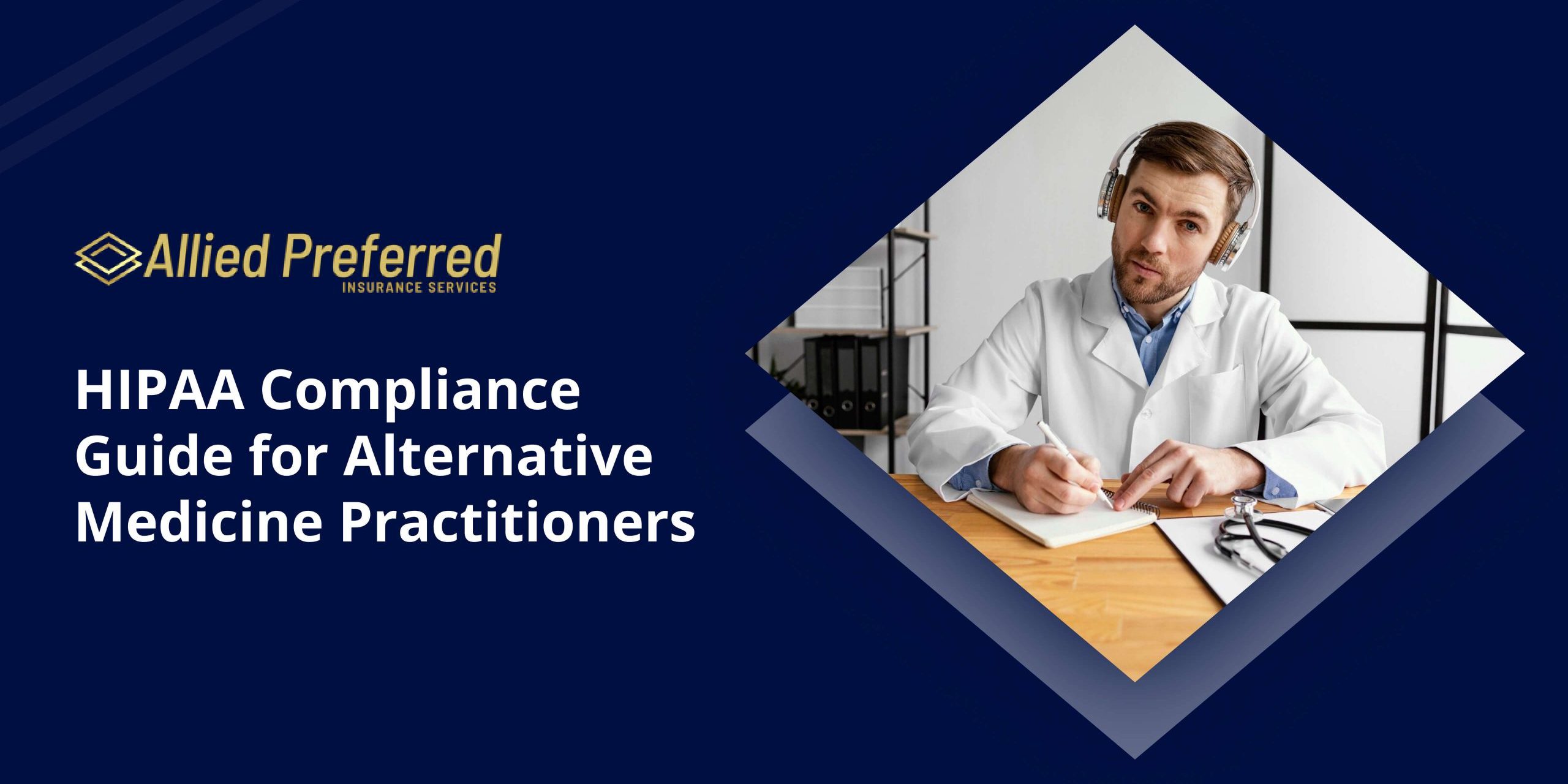HIPAA compliance is important for alternative medicine practitioners. It’s about keeping your patients’ information safe. Here’s what you need to know to follow these important rules.
| Key Takeaways |
|---|
|
1. Who Needs to Follow HIPAA Rules?
If you’re an acupuncturist, chiropractor, or any other kind of alternative medicine practitioner, HIPAA probably applies to you. If you deal with patient health info, you need to protect it.
Imagine you’re a kid with a secret diary. You wouldn’t want just anyone reading it, right? That’s how your patients feel about their health information. It’s your job to keep it safe, just like you’d guard that diary.
HIPAA applies to “covered entities,” which includes healthcare providers who conduct certain electronic transactions. This means if you bill insurance electronically or use electronic health records, you’re likely required to comply with HIPAA regulations.
2. What Information Needs Protection?
HIPAA talks about Protected Health Information (PHI). This includes your patients’ names, addresses, and any details about their health or treatments. Electronic records (ePHI) need protection too.
Think of PHI like a secret superhero identity. Just as you wouldn’t tell everyone that your friend is actually Spider-Man, you can’t share your patients’ health info without their okay.
PHI includes:
- Names
- Addresses
- Phone numbers
- Email addresses
- Social Security numbers
- Medical record numbers
- Health plan beneficiary numbers
- Account numbers
- Certificate/license numbers
- Vehicle identifiers and serial numbers
- Device identifiers and serial numbers
- Web URLs
- IP addresses
- Biometric identifiers (e.g., fingerprints)
- Full-face photographs and comparable images
- Any other unique identifying number, characteristic, or code
3. Key HIPAA Rules to Remember
There are two main parts of HIPAA: the Privacy Rule and the Security Rule. The Privacy Rule is about who can see and use patient info. The Security Rule is about keeping that info safe, especially on computers or when sent over the internet.
It’s like having a treehouse club. The Privacy Rule decides who gets to come into the treehouse, while the Security Rule makes sure the ladder is sturdy and the door has a good lock.
The Privacy Rule sets national standards for protecting personal health information. The Security Rule specifies safeguards for electronic protected health information.
4. Doing a HIPAA Risk Check-Up
You need to regularly look for weak spots in how you handle patient info. This is called a risk analysis. It’s like being a detective in your own practice, looking for ways bad guys could get to the secret info.
Maybe you notice that your computer doesn’t have a password, or that patient files are left out where anyone could see them. These are the kind of things you need to fix to stay HIPAA-compliant.
A thorough risk analysis should be done at least yearly, or when there are big changes to your practice’s operations or information systems. This helps find potential problems in your systems and processes, so you can fix them before patient information gets leaked.
HIPAA Risk Analysis Steps
- Identify where patient info is stored
- Look for potential security weak spots
- Make a plan to fix any problems
- Keep checking and updating regularly
5. Training Your Team
Everyone in your practice needs to know about HIPAA. That means teaching your staff about keeping patient info private and secure. You should have regular training sessions to keep everyone up to date.
Think of it like a sports team. Everyone needs to know the rules and practice them regularly to play the game right. In this case, the game is protecting patient privacy.
HIPAA training should cover:
- The basics of HIPAA and why it’s important
- How to identify PHI
- Proper handling and disposal of PHI
- How to report potential HIPAA violations
- The consequences of HIPAA violations for individuals and the practice
- Best practices for maintaining patient privacy in day-to-day operations
Have a training schedule that includes initial training for new employees and yearly refresher courses for all staff. Keep records of all training sessions and have employees sign that they understand and will follow HIPAA rules.
6. Dealing with Business Partners
If you work with other companies that might see patient info (like billing services or software providers), you need a Business Associate Agreement. This is a contract that says they’ll protect patient info too.
It’s like when you lend a friend your favorite toy. You make them promise to take good care of it before you hand it over. That’s what a Business Associate Agreement does for patient info.
Business Associates may include:
- Electronic Health Record (EHR) vendors
- Cloud storage providers
- Billing and collection agencies
- Accountants or lawyers who have access to PHI
- Shredding companies that handle documents containing PHI
- IT support services that may have access to systems containing PHI
The Business Associate Agreement should clearly state what the business associate must do to protect PHI, including using proper safeguards, reporting any leaks, and returning or destroying PHI when the agreement ends.
7. Using Electronic Health Records Safely
If you use computers to store patient records, you need to be extra careful. Make sure your systems follow HIPAA rules and that you’re using strong passwords and encryption. It’s also a good idea to back up your data regularly.
Think of your computer system like a digital fort. You want strong walls (firewalls), good locks (passwords), and secret codes (encryption) to keep the patient info safe from digital bad guys.
Key things to consider for electronic health records security:
- Using strong, unique passwords and multi-factor authentication
- Encrypting data both when it’s stored and when it’s being sent
- Using access controls so only authorized people can view PHI
- Regularly updating and patching software to fix security problems
- Using secure, HIPAA-compliant cloud storage for backups
- Having rules for using personal devices to access PHI
- Doing regular security checks and tests
8. Avoiding Common HIPAA Mistakes
Some HIPAA slip-ups happen more often than others. Things like gossiping about patients, leaving files where others can see them, or using weak computer passwords are big no-nos. Always think before you share any patient info, even if it seems harmless.
Imagine you’re playing a game where you can’t say a certain word. HIPAA is kind of like that, but the word is any patient info, and you can’t say it or show it to anyone who doesn’t need to know.
Other common HIPAA mistakes to avoid:
- Sending PHI via unsecured email
- Discussing patient information in public areas
- Failing to log out of computer systems when not in use
- Improperly disposing of documents containing PHI
- Losing or misplacing mobile devices containing PHI
- Failing to get proper patient permission before sharing information
- Not updating software and security measures regularly
Common HIPAA Violations
Conclusion: Keeping HIPAA a Priority
HIPAA might seem like a lot of work, but it’s very important for protecting your patients and your practice. By following these rules, you’re showing your patients that you take their privacy seriously. Good HIPAA practices can even help lower your malpractice insurance costs.
Remember, HIPAA compliance isn’t a one-time thing. It’s an ongoing process that needs your attention. But with the right knowledge and tools, you can keep your alternative medicine practice running smoothly and legally.
A good HIPAA compliance program protects your patients and your practice from legal and financial problems. Regular checks, ongoing staff education, and staying up-to-date with HIPAA changes are key to staying compliant. You might want to use HIPAA compliance software or talk to a HIPAA expert to make sure your practice is following all the current rules.
Learn more about protecting your practice with malpractice insurance






